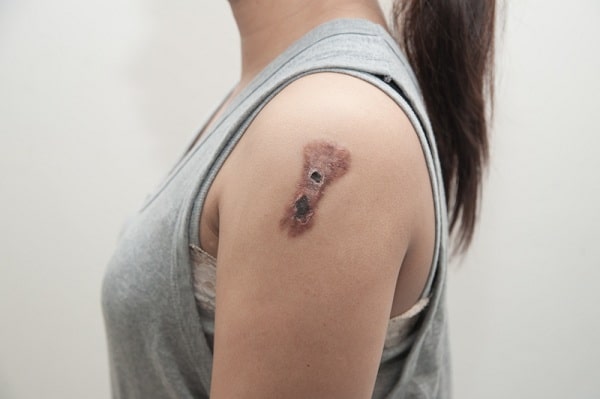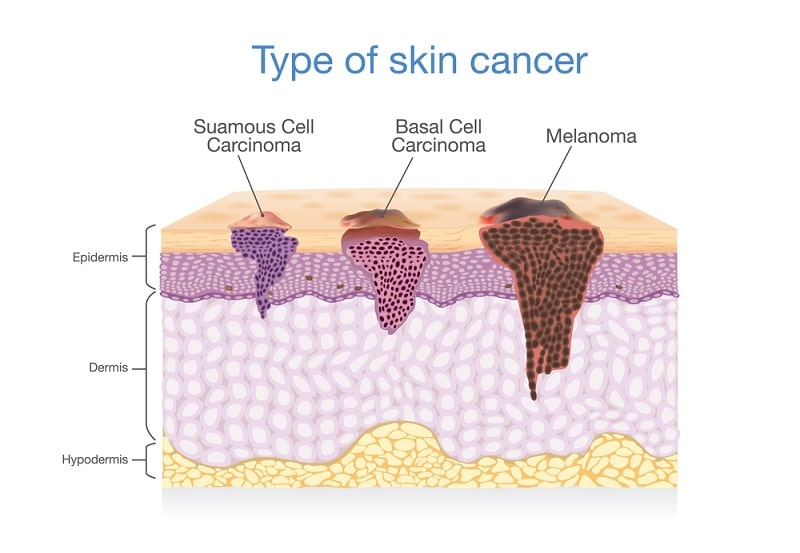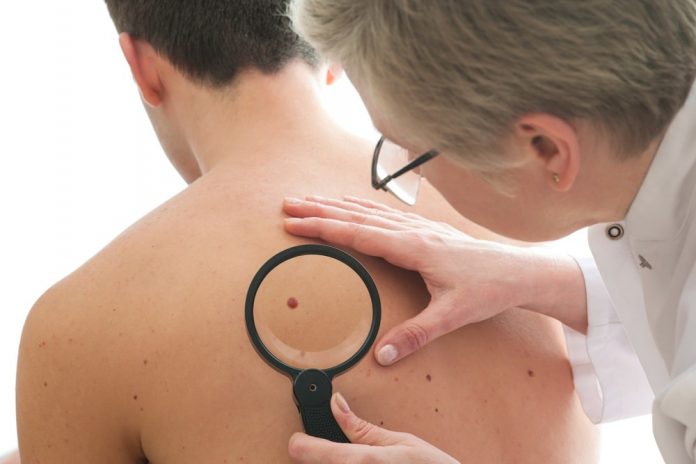Did you know that skin cancer is the most common type of cancer worldwide? With its increasing prevalence, it’s essential to understand the risks and take necessary precautions to protect ourselves.
In this post, we will delve into what exactly skin cancer is, explore the various types of skin cancer, and provide you with five effective ways to prevent it.
What is skin cancer?
Skin cancer is cancer that occurs in skin cells. It develops when there is an uncontrolled growth of abnormal skin cells, usually triggered by damage to the DNA within these cells. The main cause of this damage is ultraviolet radiation from the sun or tanning beds.

There are three primary types of cancer: basal cell carcinoma (BCC), squamous cell carcinoma (SCC), and melanoma. BCC is the most common type and often appears as a pinkish bump or shiny patch on the skin.
It’s important to be aware of any changes in your skin, such as new moles or spots that change in shape, size, or color. Early detection plays a crucial role in successfully treating and curing skin cancer.
Prevention is always better than cure! Protecting yourself from harmful UV rays can significantly reduce your risk of developing skin cancer. So, let’s examine what are the risk factors of skin cancer.
What Are The Risks of Skin Cancer?
Understanding the risks associated with this disease can help you take proactive measures to prevent it. While anyone can develop skin cancer, but certain factors increase your chances of developing it.
One significant risk factor for skin cancer is prolonged exposure to ultraviolet (UV) radiation from the sun. This includes excessive time outdoors without protection, especially during peak sun hours. Fair-skinned individuals are more susceptible to UV damage and have a higher risk of developing cancer.
Another factor that increases your risk is having a history of sunburns, particularly severe burns in childhood or adolescence. Additionally, if you have a family history of skin cancer or a personal history of precancerous lesions like actinic keratosis, you are at greater risk.
Certain medical conditions and medications may also heighten your susceptibility to skin cancer. Individuals with weakened immune systems due to diseases like AIDS/HIV or organ transplants have an increased likelihood of developing this type of cancer.
What are the various types of skin cancer?

Skin cancer is a serious and potentially life-threatening condition that can affect anyone, regardless of age or skin type. There are many types of skin cancer, each one of them with its own characteristics and treatment options.
- Basal Cell Carcinoma
- Squamous Cell Carcinoma (SCC)
- Melanoma
- Merkel Cell Carcinoma
- Dermatofibrosarcoma Protuberans (DFSP)
1. Basal Cell Carcinoma
BCC is the most common type of skin cancer, accounting for about 81% of all cases. BCC usually appears as a small, shiny bump or a red patch on the skin. It tends to grow slowly and rarely spreads to other body parts.
2. Squamous Cell Carcinoma (SCC)
SCC is the second most common type and usually appears as a scaly red patch or a thickened lump on the skin. Unlike BCC, SCC has a higher risk of spreading to other areas if left untreated.
3. Melanoma
Although less common than BCC and SCC, melanoma is much more aggressive and can be deadly if not detected early. It often develops from moles or appears as new pigmented growths on the skin.
4. Merkel Cell Carcinoma
This rare form of skin cancer usually appears as flesh-colored or bluish-red nodules on sun-exposed areas such as the head, neck, and arms.
5. Dermatofibrosarcoma Protuberans (DFSP)
DFSP is an uncommon type of soft tissue sarcoma that typically presents as firm nodules in deeper layers beneath the outermost layer of skin.
It’s important to remember that these descriptions are just general guidelines for identifying various types of skin cancer. Only trained medical professionals can provide an accurate diagnosis through proper examination and biopsy techniques.
How can I prevent skin cancer? Here are five ways
- Protect your skin from the sun’s harmful rays
- Avoid indoor tanning beds
- Perform regular self-examinations
- Get routine skin check-ups
- Stay hydrated and eat a healthy diet
1. Protect Your Skin from the Sun’s Harmful Rays
One of the most effective ways to prevent skin cancer is by protecting your skin from the sun’s harmful ultraviolet rays. Limiting exposure to sunlight, especially between 11 a.m. and 3 p.m. when the UV rays are strongest.
When you’re outside, seek shade or use umbrellas, wear protective clothing such as long-sleeved shirts and wide-brimmed hats, and always apply a broad-spectrum sunscreen with an SPF of 30 or higher.
2. Avoid Indoor Tanning Beds
Indoor tanning beds may give you a temporary bronzed glow, but they also come with serious health risks. The artificial UV radiation emitted by these devices can damage your DNA and increase your chances of developing skin cancer over time. It’s best to avoid indoor tanning altogether and opt for safer alternatives like self-tanners or spray tans.
3. Perform Regular Self-Examinations
Familiarize yourself with how your skin looks so that you can detect any changes early on. Conduct regular self-examinations where you thoroughly examine all areas of your body for any suspicious moles or growths that have changed in color, shape, size, or texture. If you notice anything unusual, consult a dermatologist for further evaluation.
4. Get Routine Skin Check-ups
Regular visits to a dermatologist are crucial for preventing skin cancer. They can perform comprehensive examinations of your entire body and identify any potential signs of trouble before they become more serious.
5. Stay Hydrated and Eat a Healthy Diet
Maintaining good health reflects positively on our bodies at every level – including our skin! Drinking 15 cups of water helps keep our bodies hydrated from within, while consuming nutrient-rich foods, such as fruits and vegetables, gives our skin the vitamins and antioxidants
Also read: What are the signs of throat cancer?
Conclusion
Understanding the risks and preventing skin cancer is crucial for maintaining overall health. Skin cancer can be a serious disease, but by following these preventive steps, you can reduce your risk.
Take care of your skin today to take care of you tomorrow!

